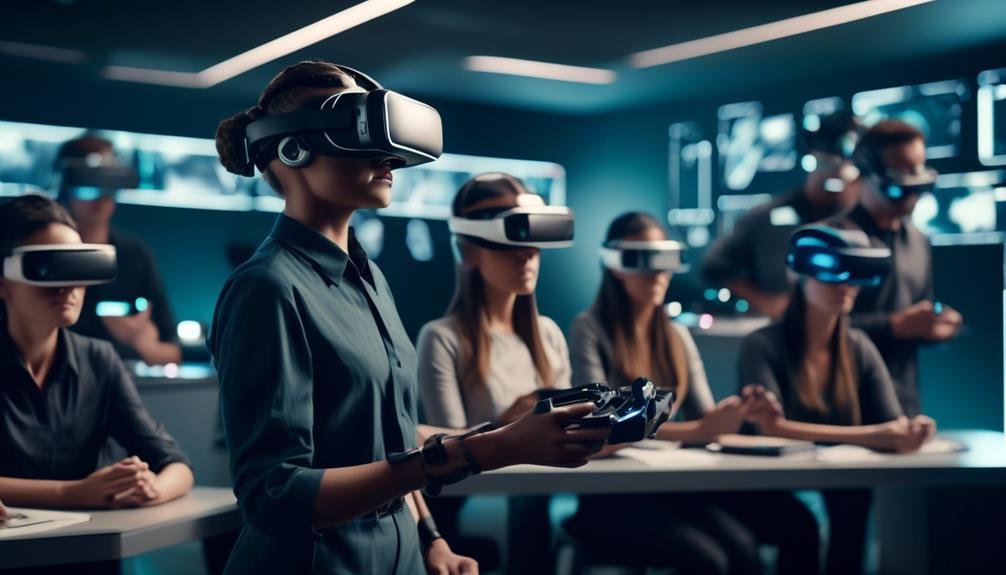The Future of E-Learning: Trends and Predictions for the Corporate World
In an age where technology is rapidly advancing, the landscape of corporate learning and development is also experiencing a significant transformation. The future of e-learning in the corporate world is marked by several emerging trends and predictions that are poised to reshape the way organizations approach training and skill development for their employees.
From the integration of adaptive learning techniques to the utilization of artificial intelligence and virtual reality, these advancements are paving the way for a more personalized and engaging learning experience.
As the corporate world continues to evolve, it becomes increasingly crucial for businesses to stay abreast of these trends in order to remain competitive and effectively nurture the talent within their organizations.
Key Takeaways
- Adaptive learning and AI technologies enhance personalized learning experiences, providing tailored content, assessments, and support based on individual needs and abilities.
- Virtual reality (VR) offers immersive and realistic training environments, allowing employees to practice and refine their skills in a safe and controlled setting.
- Microlearning breaks down learning material into small, easily digestible units, catering to the modern learner's attention span and busy schedules.
- Gamification strategies in e-learning increase employee engagement, motivation, and participation, making the learning process more interactive and enjoyable.
The Rise of Adaptive Learning
Amidst the rapidly evolving landscape of education, the rise of adaptive learning has significantly reshaped the way students engage with course material. Adaptive learning algorithms have become a game-changer in the education sector, offering personalized learning platforms that cater to individual student needs and abilities.
These algorithms work by assessing a student's performance and tailoring the learning experience to suit their specific requirements. By analyzing data on how a student interacts with the material, adaptive learning algorithms can identify areas where the student may be struggling and provide additional support in those areas. Conversely, if a student demonstrates a strong grasp of certain concepts, the platform can adapt to provide more challenging material, thus keeping the student consistently engaged and motivated.
This personalized approach to learning not only enhances student engagement but also improves learning outcomes. Students can progress at their own pace, receiving targeted assistance precisely where needed. Furthermore, educators can use the data generated by these platforms to gain insights into individual student progress and provide more effective support.
The rise of adaptive learning has undoubtedly revolutionized the education sector, paving the way for a more tailored and effective learning experience.
Harnessing the Power of Artificial Intelligence
Artificial intelligence (AI) is revolutionizing e-learning through its ability to enhance content creation, personalize learning experiences, and provide adaptive assessment tools.
With AI, educators can efficiently generate high-quality educational materials, tailor learning paths to individual students' needs, and offer assessments that adapt to each learner's progress.
This powerful technology holds immense potential to transform the landscape of e-learning, making education more effective and accessible for learners of all backgrounds.
AI in Content Creation
The emergence of artificial intelligence has revolutionized content creation, presenting unparalleled opportunities for the future of e-learning. AI-generated content and content automation are reshaping the way learning materials are developed and delivered.
Here are four key ways AI is transforming content creation in e-learning:
- Personalized Learning Content: AI analyzes user data to create personalized learning materials tailored to individual needs.
- Efficient Content Generation: AI automates the process of creating and updating learning content, saving time and resources.
- Adaptive Content Delivery: AI dynamically adjusts content delivery based on user interactions and performance, ensuring optimal learning outcomes.
- Natural Language Generation: AI-powered tools can generate human-like written content, enabling the creation of high-quality learning materials at scale.
These advancements signify a shift towards more efficient, adaptive, and personalized e-learning experiences.
Personalized Learning Experiences
Harnessing the power of artificial intelligence, personalized learning experiences are shaping the future of e-learning by tailoring educational content to individual needs and optimizing learning outcomes. AI enables customized curriculum development, allowing employees to engage with material that is directly relevant to their roles and skill levels. Through individualized instruction, AI can adapt the delivery of content to match the learning pace and preferences of each employee, resulting in more effective and efficient learning. This approach not only enhances engagement but also increases retention and application of knowledge in real-world scenarios. The table below provides a simplified comparison of traditional learning methods versus personalized learning experiences driven by AI.
| Traditional Learning | Personalized Learning Experience |
|---|---|
| One-size-fits-all approach | Customized curriculum based on individual needs |
| Limited adaptability | Individualized instruction and pace |
| Static content delivery | Dynamic content tailored to learner's preferences |
This shift towards personalized learning experiences is revolutionizing corporate training, offering a more effective and efficient way to upskill and reskill employees.
Adaptive Assessment Tools
The pivot from personalized learning experiences to adaptive assessment tools in e-learning underscores the ongoing evolution of AI-driven educational platforms to cater to individualized learning needs and measure learning progress more effectively.
Adaptive assessment strategies leverage the power of artificial intelligence to tailor assessment content and difficulty levels based on the learner's demonstrated knowledge, providing a more accurate and personalized evaluation. These tools analyze vast amounts of data to identify patterns and trends in the learner's performance, enabling data-driven personalization of learning experiences.
By continuously adjusting the assessment to match the learner's proficiency, adaptive assessment tools create a more engaging and effective learning environment. This approach not only enhances the accuracy of gauging learners' understanding but also fosters a more efficient and tailored learning experience.
- Tailoring assessment content and difficulty levels
- Analyzing data for personalized evaluation
- Continuous adjustment of assessments
- Enhancing accuracy and efficiency
Embracing Virtual Reality for Training
Virtual Reality (VR) is revolutionizing the way training is conducted. It offers simulated learning environments and immersive experiences that were previously unattainable.
By embracing VR for training, organizations can provide employees with hands-on experiences in a safe and controlled virtual setting. This allows them to practice and refine their skills without real-world consequences.
This technology has the potential to significantly enhance the effectiveness of training programs. It ultimately leads to better-prepared and more confident employees.
VR for Simulated Learning
Embracing virtual reality technology for training purposes has the potential to revolutionize simulated learning experiences in the e-learning landscape.
Virtual simulations offer an immersive environment where employees can engage in realistic scenarios, enhancing their practical skills and decision-making abilities.
Incorporating interactive scenarios within virtual reality training allows for hands-on learning experiences, enabling employees to apply their knowledge in a controlled yet realistic setting.
Moreover, VR for simulated learning provides a safe space for employees to make mistakes and learn from them without real-world consequences.
This technology also enables organizations to create customized training modules tailored to specific job roles or industries, ensuring that learning experiences are relevant and impactful.
Immersive Training Experiences
Immersive training experiences utilizing virtual reality technology have the potential to redefine the way employees engage in practical learning scenarios within the e-learning landscape. By leveraging immersive simulations, employees can be placed in interactive scenarios that mimic real-world experiences, enabling them to learn by doing rather than passively consuming information.
This approach allows for a more engaging and effective learning process, as employees can actively participate in hands-on training, make decisions, and experience the consequences of their actions in a safe and controlled environment.
Additionally, immersive training experiences using virtual reality can cater to different learning styles, offering a more inclusive and adaptable learning environment.
As virtual reality technology continues to advance, its integration into e-learning platforms is poised to revolutionize corporate training methodologies, providing more impactful and memorable learning experiences.
The Shift Towards Microlearning
In recent years, there has been a notable shift towards microlearning as an effective and efficient approach to delivering educational content. Microlearning involves breaking down learning material into small, easily digestible units, typically lasting no more than 10 minutes each. This shift is driven by the need for engaging microlearning modules that cater to the modern learner's shrinking attention span and busy schedules.
Furthermore, microlearning has proven to be a powerful tool for effective knowledge retention, as it allows learners to focus on one specific learning objective at a time, leading to better information recall. The following are key aspects highlighting the shift towards microlearning:
- Flexibility: Microlearning provides the flexibility for learners to access content at their convenience, fitting into their busy schedules.
- Accessibility: With the rise of mobile learning, microlearning modules can be accessed anytime, anywhere, making learning more accessible.
- Personalization: Microlearning allows for personalized learning paths, catering to individual learner's needs and preferences.
- Cost-Effectiveness: Organizations are increasingly adopting microlearning due to its cost-effectiveness in terms of development and delivery.
This shift towards microlearning signifies a more learner-centered, efficient, and impactful approach to corporate training and development.
Personalized Learning Paths
The growing emphasis on catering to individual learner's needs and preferences has led to a significant focus on personalized learning paths in the realm of e-learning.
Individualized instruction and tailored content are becoming increasingly prevalent as organizations recognize the importance of customizing learning experiences to meet the unique requirements of each employee.
This personalized approach allows learners to progress at their own pace, focusing on areas where they need additional support while moving more quickly through familiar topics.
Moreover, personalized feedback provides learners with specific insights into their performance, enabling them to address their weaknesses and build on their strengths effectively.
The Impact of Gamification on Employee Engagement
Enhancing employee engagement through the implementation of gamification strategies has emerged as a pivotal aspect of modern e-learning initiatives. Gamification involves integrating game mechanics, such as competition, point scoring, and rewards, into non-game contexts to motivate participation, engagement, and loyalty. When applied to e-learning in the corporate world, gamification can have a significant impact on employee motivation and learning outcomes.
- Increased Motivation: Gamification provides employees with a sense of achievement and progress, which can enhance their motivation to actively participate in e-learning programs.
- Enhanced Learning Experience: Game mechanics, such as levels, badges, and leaderboards, make the learning process more interactive and enjoyable, leading to improved engagement and knowledge retention.
- Healthy Competition: Introducing elements of competition through gamification can stimulate employees to strive for continuous improvement and better performance.
- Reward System: Implementing rewards, such as virtual badges or points, can incentivize employees to complete tasks and modules, driving higher engagement and completion rates.
Conclusion
In conclusion, the future of e-learning in the corporate world is poised for an unprecedented revolution.
The integration of adaptive learning, artificial intelligence, virtual reality, microlearning, personalized learning paths, and gamification will transform the way employees acquire knowledge and skills.
This seismic shift will propel organizations to new heights of productivity and innovation, creating a workforce that is truly unstoppable in its pursuit of excellence.







